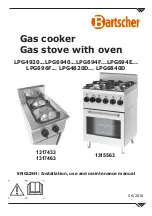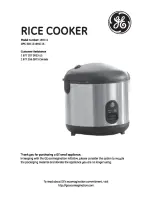
19
Hints on Using Your Induction Cooker
If you have not used an induction cooker before please be
aware of the following:
•
Make sure that the pans you have or buy are suitable
for use on the induction hob. Stainless steel, enamelled
steel or cast iron is ideal. Double check before you
buy pans – they must have bases that would attract a
magnet.
•
Allow time to get used to induction cooking; it is fast
and powerful as well as being gentle. When simmering,
you may notice that liquids appear to stop bubbling and
then start again almost immediately. This is perfectly
normal.
•
You may notice a faint vibrating sound coming from
the pans when using the induction hob. Again, this is
perfectly normal and will depend upon the type and
style of pans you are using.
•
The induction heating elements will phase on and off
when cooking. Although an active cooking zone may
appear to switch on and off, a constant heat is still being
supplied to the base of the pan – this is completely
normal.
Tips on Cooking with the Timer
If you want to cook more than one dish, choose dishes that
require approximately the same cooking time. However,
dishes can be ‘slowed down’ slightly by using small containers
and covering them with aluminium foil, or ‘speeded up’
slightly by cooking smaller quantities or placing them in
larger containers.
Very perishable foods such as pork or fish should be avoided
if a long delay period is planned, especially in hot weather.
n
n
DO NOT place warm food in the oven to be timed.
n
n
DO NOT use a timed oven that is already warm.
n
n
DO NOT use the timed oven if the adjoining oven is
already warm.
Whole poultry must be thoroughly defrosted before being
placed in the oven. Check that meat and poultry are fully
cooked before serving.
General Oven Tips
The wire shelves should always be pushed firmly to the back
of the oven.
Baking trays with food cooking on them should be placed
level with the front edge of the oven’s wire shelves. Other
containers should be placed centrally. Keep all trays and
containers away from the back of the oven, as overbrowning
of the food may occur.
For even browning, the maximum recommended size of a
baking tray are:
•
depth: 340 mm (13 3/8”) by width: 340 mm (13 3/8”) in the
main oven
When the oven is on, DO NOT leave the door open for
longer than necessary, otherwise the knobs may get very
hot.
•
Always leave a “finger’s width” between dishes on
the same shelf. This allows the heat to circulate freely
around them.
•
To reduce fat splashing when you add vegetables to hot
fat around a roast, dry them thoroughly or brush lightly
with cooking oil.
•
Where dishes may boil and spill over during cooking,
place them on a baking tray.
•
The ‘Cook & Clean’ oven liners (see ‘Cleaning Your
Cooker’) work better when fat splashes are avoided.
Cover meat when cooking.
•
Sufficient heat rises out of the oven while cooking to
warm plates in the grill compartment.
•
If you want to brown the base of a pastry dish, preheat
the baking tray for 15 minutes before placing the dish in
the centre of the tray.
5. Cooking Tips
Содержание 110 Masterchef XL
Страница 1: ...USER GUIDE INSTALLATION INSTRUCTIONS MASTERCHEFXL 110 Induction U110183 05...
Страница 4: ...ii...
Страница 43: ...39 NOTE...
Страница 44: ...40 NOTE...
Страница 45: ...41 NOTE...
Страница 46: ......
Страница 47: ......
















































